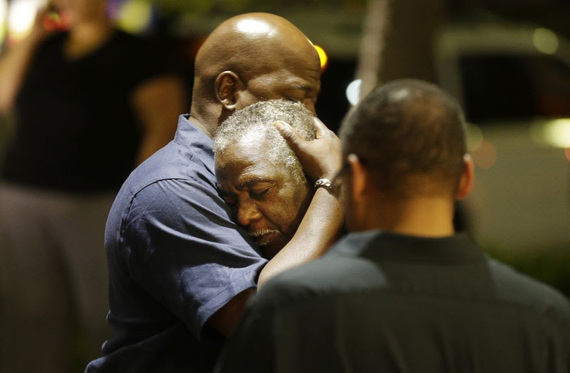It has been said that the task of a rabbi is to comfort the afflicted and afflict the comfortable. We are all afflicted. We are afflicted by the horrific murder of nine people gathered for a Bible study at a church in South Carolina. We are afflicted by the plague of violent racism rearing its ugly head in a House of God.
All of victims were black. All were members of an historic black church. All of them had family, friends, loved ones grieving in shock and horror. Four of them were ministers.
The word "comfort" means to strengthen. What can strengthen us in the wake of such horror? For some it is prayer. For others it is political action. For many it is finding the perpetrator and bring him to justice.
Where Hope Lives
But none of these actions can bring back the dead. And none of them address the scourge of racism and violence in our culture. The only way to address these plagues is to look closely at ourselves. (You can learn more about the Jewish practice of cheshbon hanefesh, self-examination here.)
What are we doing to stop violence? What are we doing to build deeper ties with those of other races and ethnicities?
A Lesson from Jewish History
It is easy to become complacent. It is easy to display righteous indignation one day and return to business as usual the next. But such acts will not solve the problem. Only we can.
Jewish history teaches this lesson many times. Perhaps the most profound example was after the destruction of the First Temple in Jerusalem. The Babylonians destroyed that temple in 586 B.C.E.
Judaism could have died at that point. That was the customary fate of cultures whose central shrine was destroyed. What saved the Jewish people?
"The Better Angels of Our Nature"
It was the rise of the Prophet -- the mouthpiece of God who called the people to self-examination. It was the Prophets who called the people to look closely at themselves.
"Do not blame the Babylonians for your fate? Do not blame their might and power. Look at ourselves," the Prophets said. Look at your behavior;. Look at your beliefs. Look at your actions.
"Return to you who you really are," the Prophets said. The Hebrew word for repentance --teshuvah -- literally means "return." Return, God said, to the truths I taught you at Mount Sinai. Return to what Abraham Lincoln would later call "the better angels of our nature."
We Can Do Better
That is our task today. As a nation we are clearly capable of great things. We have the strongest economy in the world. We have the strongest military in the world. We have the freest society in the world.
But we can do better. Let this horrific shooting serve as a wake up call to bring back the better angels of our nature.
The only we can comfort the afflicted now is to afflict those of us comfortable with how things are. We may not solve the problem of violent racism, but we cannot ignore or pretend it doesn't matter. As a great rabbi once said, "It is not your obligation to complete the task, but neither are you free to desist from it." To that we can only say amen. Begin the practice of self-examination with these three steps.
